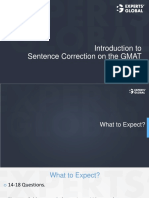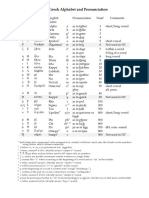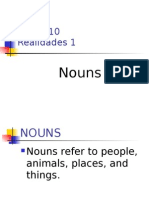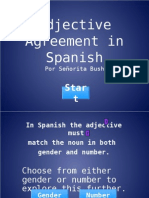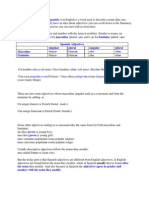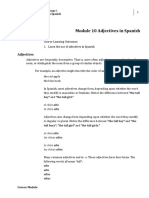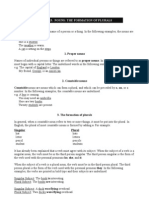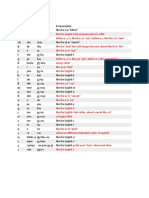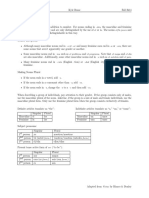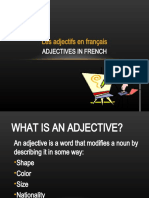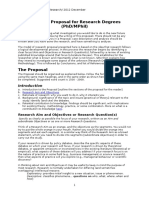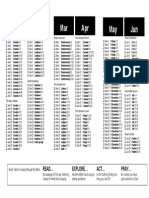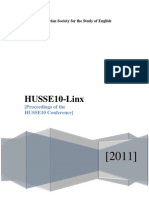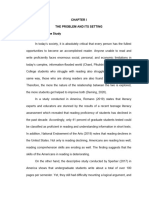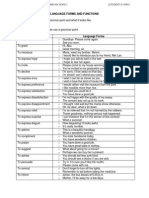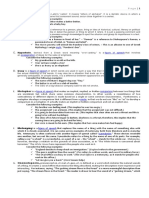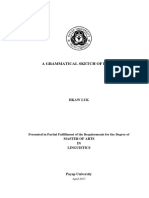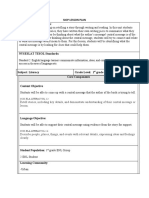Singular Adjectives: Los Adjectivos
Singular Adjectives: Los Adjectivos
Uploaded by
Pearl Kimberly Quidor LavarezCopyright:
Available Formats
Singular Adjectives: Los Adjectivos
Singular Adjectives: Los Adjectivos
Uploaded by
Pearl Kimberly Quidor LavarezOriginal Description:
Original Title
Copyright
Available Formats
Share this document
Did you find this document useful?
Is this content inappropriate?
Copyright:
Available Formats
Singular Adjectives: Los Adjectivos
Singular Adjectives: Los Adjectivos
Uploaded by
Pearl Kimberly Quidor LavarezCopyright:
Available Formats
Los adjectivos
Adjectives are words that describe nouns. Spanish adjectives, like articles, are also
modified according to the noun it describes. We follow certain rules in using them. They could be
masculine or feminine and singular or plural depending on the gender and number of the noun. And
almost always the Spanish adjectives follow the noun they describe.
Singular Adjectives
Masculine
Adjectives that end in -o are masculine. They are used in describing masculine nouns.
The tall boy
El alto
muchacho
*translating it into spanish, nouns should come first before the adjective
The tall boy
*instead of translating it into: El alto muchacho
*it would be: El muchacho alto
El profesor guapo
El carro rojo
The hansome professor
The red car
El hombre simptico
The nice man
El mandato derecho
The right rule
Feminine
To form the feminine adjective, change the -o into -a to complement the feminine noun.
The tall girl
La
alta
muchacha
*since the noun girl is feminine, the article el is changed into la to complement its
gender and number. The adjective also follows the modification of the noun's gender and
number.
The tall girl
*instead of translating it into: La alta muchacha
*it would be: La muchacha alta
La profesora guapa
The Beautiful professor
La casa roja
The red house
La mujer simptica
The nice woman
La camina derecha
The right way
There are also adjectives that do not end in -o. These adjectives describe both the masculine and
the feminine nouns. Their endings are not modified anymore.
El libro excelente
The excellent book
El tren gris
The gray train
La tienda excelente
The excellent store
La pluma gris
The gray pen
Plural Adjectives
Masculine and Feminine
Masculine and feminine adjectives that end in vowels, -o, -a, -e, are added with -s to make
it in plural form.
los profesores gwapos
las mujeres simpticas
los libros excelentes
los carros rojos
las caminas derechas
las aulas grandes
To form the plural form of the adjectives that does not end in vowel add -es.
Los actores populares
The popular actors
Los examenes facles
The easy examinations
Los documentos oficiales
The official documents
Las reglas pricipales
The principla rules
Reading Comprehension.
Mi cuarto
Mi cuarto es pequeo pero simple. La ventana es de madera con cortina verde. La pared es
blanco. Hay un espejo antiguo y mesa pequea. La cama grande es con muchas almohadas. La lmpara
en la mesa es gris. Hay libros antigos y revistas nuevas tambien. Yo amo quedar en mi cama todos los
dias.
1. Is the room big or small?
_________________________________________________________________
2. What is the color of the curtains?
_________________________________________________________________
3. Which is small? The mirror or the table?
_________________________________________________________________
4. What is the color of the lamp?
_________________________________________________________________
5. Which is new? The books or the magazines?
_________________________________________________________________
(Translate the paragraph above to English)
You might also like
- My Father Goes To CourtDocument6 pagesMy Father Goes To CourtLanie Montefalco40% (5)
- Spanish Grammar: Theory and ExercisesFrom EverandSpanish Grammar: Theory and ExercisesRating: 3.5 out of 5 stars3.5/5 (6)
- Expert Global SCDocument575 pagesExpert Global SCT Hawk100% (1)
- An Innovative Work PlanDocument10 pagesAn Innovative Work PlanPrincess May Geronimo ParaynoNo ratings yet
- The Greek Alphabet and Pronunciation PDFDocument2 pagesThe Greek Alphabet and Pronunciation PDFClaudioNo ratings yet
- Spanish Adjectives: Part I: NotesDocument3 pagesSpanish Adjectives: Part I: NotesHoJoJoNo ratings yet
- Powerpoint Gramatica Gender and Number of NounsDocument25 pagesPowerpoint Gramatica Gender and Number of NounsDaniela YordanovaNo ratings yet
- Lesson 8 - AdjectivosDocument7 pagesLesson 8 - AdjectivosMichael Ballesteros GarciaNo ratings yet
- Spanish-Tips and NotesDocument5 pagesSpanish-Tips and NotesinfocuszooNo ratings yet
- Nouns: Gender: Listen To The Following ExamplesDocument7 pagesNouns: Gender: Listen To The Following Examplessarahjanemsith100No ratings yet
- Adjectives Are Words That Describe A NounDocument43 pagesAdjectives Are Words That Describe A NounsmitasyaNo ratings yet
- Adjectives in PortugueseDocument14 pagesAdjectives in PortugueseHeidiNo ratings yet
- Descriptive AdjectivesDocument6 pagesDescriptive Adjectivesjae eNo ratings yet
- P 110 NounsDocument18 pagesP 110 Nounsamn628No ratings yet
- La Gramática (El Sustantivo) : Por: Jefferson B. Lerona, LPT, MCM, PHD (C)Document70 pagesLa Gramática (El Sustantivo) : Por: Jefferson B. Lerona, LPT, MCM, PHD (C)Trisha Mae MarquezNo ratings yet
- The Gender and Number of Nouns: GENRE: Masculine - FeminineDocument5 pagesThe Gender and Number of Nouns: GENRE: Masculine - FeminineEmmanuel ChadeeNo ratings yet
- Nouns and ArticlesDocument21 pagesNouns and ArticlesNoel NerioNo ratings yet
- Gender of NounsDocument10 pagesGender of Nounsapi-298162596No ratings yet
- Nouns and ArticlesDocument21 pagesNouns and ArticlesMauro CalagnaNo ratings yet
- Adjectiveagreement 1Document128 pagesAdjectiveagreement 1api-300741114No ratings yet
- Adjective AgreementDocument1 pageAdjective AgreementDoctoraHolderNo ratings yet
- 4) AdjectiveDocument6 pages4) AdjectiveRishabh ManochaNo ratings yet
- La Gramática El SustantivoDocument33 pagesLa Gramática El Sustantivorising starNo ratings yet
- Grammar Lesson 1 Nouns and AdjectivesDocument6 pagesGrammar Lesson 1 Nouns and Adjectivesapi-268368864No ratings yet
- Adjective NotesDocument1 pageAdjective Notesapi-338662559No ratings yet
- Phrases in Spanish The Plural in SpanishDocument2 pagesPhrases in Spanish The Plural in SpanishRishabh ManochaNo ratings yet
- Matching Adjectives To Their Nouns: Regular or Irregular?Document3 pagesMatching Adjectives To Their Nouns: Regular or Irregular?F MyersNo ratings yet
- Topic 2 Nouns (Foreign Language: Spanish)Document7 pagesTopic 2 Nouns (Foreign Language: Spanish)Nina Elisie ElorzaNo ratings yet
- SpanishDocument23 pagesSpanishMICKEY ANGEL CORTEZNo ratings yet
- Foreign Language Midterm NotesDocument24 pagesForeign Language Midterm Noteschloekent loreNo ratings yet
- #7 Comparative and SuperlativeDocument5 pages#7 Comparative and SuperlativeDarlyn Joy TolentinoNo ratings yet
- SingularPluralandPossessive NounsDocument4 pagesSingularPluralandPossessive NounsSN Toni SolerNo ratings yet
- Archivo de EspañolDocument18 pagesArchivo de EspañolKira ProfNo ratings yet
- Order of AdjectivesDocument5 pagesOrder of AdjectivesJanine EspinedaNo ratings yet
- Apuntes de Clase-Week 1Document4 pagesApuntes de Clase-Week 1AmandaJohnsonVMNo ratings yet
- Spanish 101: Lección 1Document14 pagesSpanish 101: Lección 1Rose Jay VIDALNo ratings yet
- AgreementDocument15 pagesAgreementGabriela MccawleyNo ratings yet
- Cognates 091115235310 Phpapp02Document28 pagesCognates 091115235310 Phpapp02vanesa84No ratings yet
- W12 - Adjectives in SpanishDocument6 pagesW12 - Adjectives in SpanishRonalyn C. CariasNo ratings yet
- There Are Rules For Most Gender Determinations. Word-Endings That Identify Feminine Words IncludeDocument2 pagesThere Are Rules For Most Gender Determinations. Word-Endings That Identify Feminine Words IncludeKhawla AdnanNo ratings yet
- Spanish NounsDocument20 pagesSpanish NounsMaria FortinoNo ratings yet
- Gramática en EspañolDocument17 pagesGramática en EspañolMauricio Rodriguez100% (2)
- Nouns - The Formation of PluralsDocument6 pagesNouns - The Formation of Pluralsbáh_leeNo ratings yet
- AdjectivesDocument19 pagesAdjectivesapi-242894068100% (4)
- PHẦN NGỮ PHÁPDocument15 pagesPHẦN NGỮ PHÁPTư MaiNo ratings yet
- Guided Notes Adjective Noun Agreement and The Verb SerDocument4 pagesGuided Notes Adjective Noun Agreement and The Verb Serapi-246261720No ratings yet
- You Too Can Learn SpanishDocument49 pagesYou Too Can Learn SpanishnamasteamizadeNo ratings yet
- Articles in Spanish GrammarDocument7 pagesArticles in Spanish GrammarJenny KeyNo ratings yet
- Spanish NounDocument8 pagesSpanish NounAny O'NeillNo ratings yet
- Alphabet SpanishDocument4 pagesAlphabet SpanishMark Louie ManriqueNo ratings yet
- Gender and Spanish WordsDocument21 pagesGender and Spanish WordsSenoritaNievesNo ratings yet
- Adjectives - AdjetivosDocument1 pageAdjectives - AdjetivosMichael HopkinsNo ratings yet
- Summary ExpDocument7 pagesSummary ExpAndrea100% (1)
- Adjective: Many Stores Have Already Begun To Play Irritating Christmas MusicDocument2 pagesAdjective: Many Stores Have Already Begun To Play Irritating Christmas MusicEni SuzantiNo ratings yet
- Greetings: Tudo. (Answer) Tudo Bem. (Answer)Document4 pagesGreetings: Tudo. (Answer) Tudo Bem. (Answer)fnonohayNo ratings yet
- Vistas Spanish NotesDocument3 pagesVistas Spanish NotesKyle BusseNo ratings yet
- Level B1 Grammar ListDocument92 pagesLevel B1 Grammar ListВасилиса ТюфяковаNo ratings yet
- Pre Course Grammar ModuleDocument29 pagesPre Course Grammar ModuleSoldevilla ShoNo ratings yet
- Les Adjectifs en Français: Adjectives in FrenchDocument17 pagesLes Adjectifs en Français: Adjectives in FrenchRamazan Mert Ural100% (1)
- A1 GrammarDocument26 pagesA1 GrammarEmilgsNo ratings yet
- Lecture 4 - Decisions and Conditions - EDITEDDocument24 pagesLecture 4 - Decisions and Conditions - EDITEDPearl Kimberly Quidor Lavarez100% (1)
- Data Types SQLDocument11 pagesData Types SQLPearl Kimberly Quidor LavarezNo ratings yet
- Research Proposal Structure DoctoralDocument6 pagesResearch Proposal Structure DoctoralPearl Kimberly Quidor LavarezNo ratings yet
- 6 - Tables of A DatabaseDocument30 pages6 - Tables of A DatabasePearl Kimberly Quidor LavarezNo ratings yet
- Lit - Terms AnswersDocument8 pagesLit - Terms AnswersPearl Kimberly Quidor LavarezNo ratings yet
- Stylistics & Lit. GlossaryDocument5 pagesStylistics & Lit. GlossaryPearl Kimberly Quidor LavarezNo ratings yet
- 1 - Year Bible Reading PlanDocument2 pages1 - Year Bible Reading PlanPearl Kimberly Quidor Lavarez100% (1)
- Past Tenses ReviewDocument9 pagesPast Tenses ReviewmariaNo ratings yet
- EAP Worksheet Cohiesive DevisesDocument4 pagesEAP Worksheet Cohiesive DevisesSally IbrahimNo ratings yet
- 5086 12217 2 PBmalipaDocument9 pages5086 12217 2 PBmalipaLy Se LedioNo ratings yet
- Understanding, Thinking and Exploring: Cultural Teaching of Vocabularies Under The New English Curriculum StandardDocument6 pagesUnderstanding, Thinking and Exploring: Cultural Teaching of Vocabularies Under The New English Curriculum StandardMonika GuptaNo ratings yet
- Difference Between KBSR and KSSRDocument12 pagesDifference Between KBSR and KSSRFarah Nadia100% (2)
- HUSSE10 LinxDocument190 pagesHUSSE10 LinxKatalin Balogné BércesNo ratings yet
- Peristilahan Perawatan Tubuh Secara Tradisional Pada Masyarakat Melayu Sambas Sebagai Model Pembelajaran Berbasis TeksDocument12 pagesPeristilahan Perawatan Tubuh Secara Tradisional Pada Masyarakat Melayu Sambas Sebagai Model Pembelajaran Berbasis TeksMuhammad RizkyNo ratings yet
- Chapter I II RevisedDocument37 pagesChapter I II RevisedJenefer Chavez-GuadalquiverNo ratings yet
- FLAT Restructured by RICKYDocument22 pagesFLAT Restructured by RICKYBeverlene Enso Lesoy-CordovaNo ratings yet
- Language Forms and FunctionsDocument6 pagesLanguage Forms and FunctionsSarahSabillahIbrahim100% (1)
- Figures of Speech HandoutDocument4 pagesFigures of Speech HandoutLiz GnvyNo ratings yet
- IC5 Level Intro - CEFR - UnitDocument24 pagesIC5 Level Intro - CEFR - UnitLucas GorhNo ratings yet
- The Teachers Role in Reducing Learners' Anxiety in Second Language ProductionDocument10 pagesThe Teachers Role in Reducing Learners' Anxiety in Second Language ProductionQuennie Mae DianonNo ratings yet
- Sword World 2.5 - Core Rulebook IIDocument437 pagesSword World 2.5 - Core Rulebook IIJoshua50% (2)
- Do It Right 1 - WORKBOOKDocument24 pagesDo It Right 1 - WORKBOOKMelanchthon Crisostomo GilvonioNo ratings yet
- Take-Home Exam Modelo English SemanticsDocument6 pagesTake-Home Exam Modelo English SemanticsJosé Roberto Álvarez VargasNo ratings yet
- DiscourseDocument21 pagesDiscourseTindy B. RasmaningtyaNo ratings yet
- KTEA3 OverviewDocument7 pagesKTEA3 Overviewchinliew0211No ratings yet
- Essay On My School in EnglishDocument6 pagesEssay On My School in Englishvqrhuwwhd100% (2)
- QUANTITYDocument4 pagesQUANTITYSandra BinstokNo ratings yet
- English ContinuumDocument191 pagesEnglish ContinuumdeepashajiNo ratings yet
- Simple Past Tense - Definition, Structure, RulesDocument1 pageSimple Past Tense - Definition, Structure, RulesLoraine MandapNo ratings yet
- Reading SkillsDocument18 pagesReading SkillsJuan ReneNo ratings yet
- Luk Hkaw Thesis2017Document202 pagesLuk Hkaw Thesis2017Guldre1okkNo ratings yet
- AssimilationDocument17 pagesAssimilationNancy Bonilla100% (2)
- Новий Microsoft Word DocumentDocument3 pagesНовий Microsoft Word DocumentMaryna PetrunNo ratings yet
- sample test a1 english pdf - Αναζήτηση GoogleDocument1 pagesample test a1 english pdf - Αναζήτηση GoogleJenny KyrtsiNo ratings yet
- Siop Lesson Plan - ElementaryDocument8 pagesSiop Lesson Plan - Elementaryapi-547615210No ratings yet


